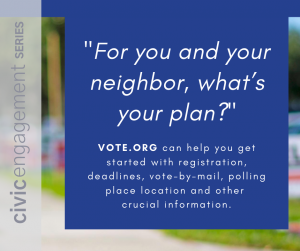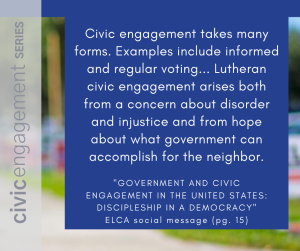by Tessa Comnick, Hunger Advocacy Fellow
Like many people, I have spent the last several months living out of my house. While that may not seem like a significant statement—I mean, houses are where we live—living out of my house has taken on new meaning. It’s now where I socialize (virtually), where I work, where I sleep, where I eat… and soon it will be where I vote in the 2020 election.
 I have actually voted by mail for the past several years, coming from a state with no-excuse absentee ballots (that means you don’t need a reason why you cannot physically be present at a polling place to use a mail-in ballot). When I decided to work at my local polling place one year, this habit ended up being very fortuitous. I voted from the comfort of my own home so that I wouldn’t have to think about it during my long (but rewarding) fifteen-hour-day as a volunteer. As that day dragged on, I even thought: “Why doesn’t everyone vote by mail?”
I have actually voted by mail for the past several years, coming from a state with no-excuse absentee ballots (that means you don’t need a reason why you cannot physically be present at a polling place to use a mail-in ballot). When I decided to work at my local polling place one year, this habit ended up being very fortuitous. I voted from the comfort of my own home so that I wouldn’t have to think about it during my long (but rewarding) fifteen-hour-day as a volunteer. As that day dragged on, I even thought: “Why doesn’t everyone vote by mail?”
But there are reasons everyone doesn’t vote by mail. It’s different for me than it is for others. I have no disabilities that keep me from being able to send in a paper ballot, requiring a voting machine to confidently and privately vote. I have a home address, one that didn’t change even when I was at school or completing fellowships. I don’t come from a socially marginalized and/or oppressed group that has learned not to trust certain systems because they have continually failed me. The question that flew through my head never took into account experiences that weren’t exclusively mine.
We as a country cannot operate in a one-size-fits-all paradigm, especially with something as crucial as our right to vote. We need to prepare ourselves for a 2020 election that enfranchises everyone’s vote. Mail in voting should be expanded during the current global pandemic crisis, but it should not be the only option.
- SUPPORT MAIL-IN ACCESS – Currently there are 16 states that still require specific reasons or excuses to request an absentee ballot. A nation-wide no-excuse absentee ballot system could help keep lines down, keep the system from getting overwhelmed, and allow high-risk individuals to continue saying home, all while still providing the opportunity for in-person voting for those who need it.
- LIMIT MAILED BALLOT REJECTIONS – Read and share local voting by mail information so that mistakes, such as a missing signature, do not result in ballot rejections. This information should be available in multiple languages and in multiple forms, so as not to exclude anyone without access to internet.
 GET SPACES READY – Polling places should be available for those who will not vote otherwise. Some voters with disabilities, voters with language access needs and American Indian and Alaska Native voters among others need safe, in-person options for fair access. Buildings that are currently sitting closed, like churches, could be used as polling places. Guidelines to minimize the risk of transmitting COVID-19 at the polls can be followed, such as those jointly issued by The Brennan Center and the Infectious Diseases Society of America.
GET SPACES READY – Polling places should be available for those who will not vote otherwise. Some voters with disabilities, voters with language access needs and American Indian and Alaska Native voters among others need safe, in-person options for fair access. Buildings that are currently sitting closed, like churches, could be used as polling places. Guidelines to minimize the risk of transmitting COVID-19 at the polls can be followed, such as those jointly issued by The Brennan Center and the Infectious Diseases Society of America.- IS BEING A POLLING WORKER FOR YOU? – Over half of U.S. poll workers were 61 years of age or older in the 2018 general election. In 2020 we could face a shortage. Youth and young adults should consider working on election day (hello to making it a National Holiday!) to help keep those at higher risk safe. When I did it, the day was long, but I heard an endless supply of “thank yous” showing appreciation for an open, accessible system from which to vote. I did not know what faith traditions voters followed, if any, but love for our community connected us in a way that was intrinsically divine. For me, I feel God’s presence strongest when I am among my community, expressing my love for every single member. God’s love is for us all, indiscriminately.
For you and your neighbor, what’s your plan? Learn what qualifies for an absentee ballot in your state. Instructions on how to register and vote-by-mail need to be effectively planned and widely distributed months before an election, to ensure equal access to those who may choose to mail-in their vote. Learn about becoming a poll worker if that sounds right for you. And contact your county Board of Elections to find out how to designate a place you’re connected with as a polling site.
And if you want to encourage election considerations in the next COVID-19 stimulus legislation, write to your lawmakers using the Action Alert “Take Action on the Next Coronavirus Supplemental Bill” at ELCA.org/advocacy/actioncenter. And learn more about the ELCAvotes initiative at ELCA.org/votes.
Every vote counts, and so does every decision on how to vote.
